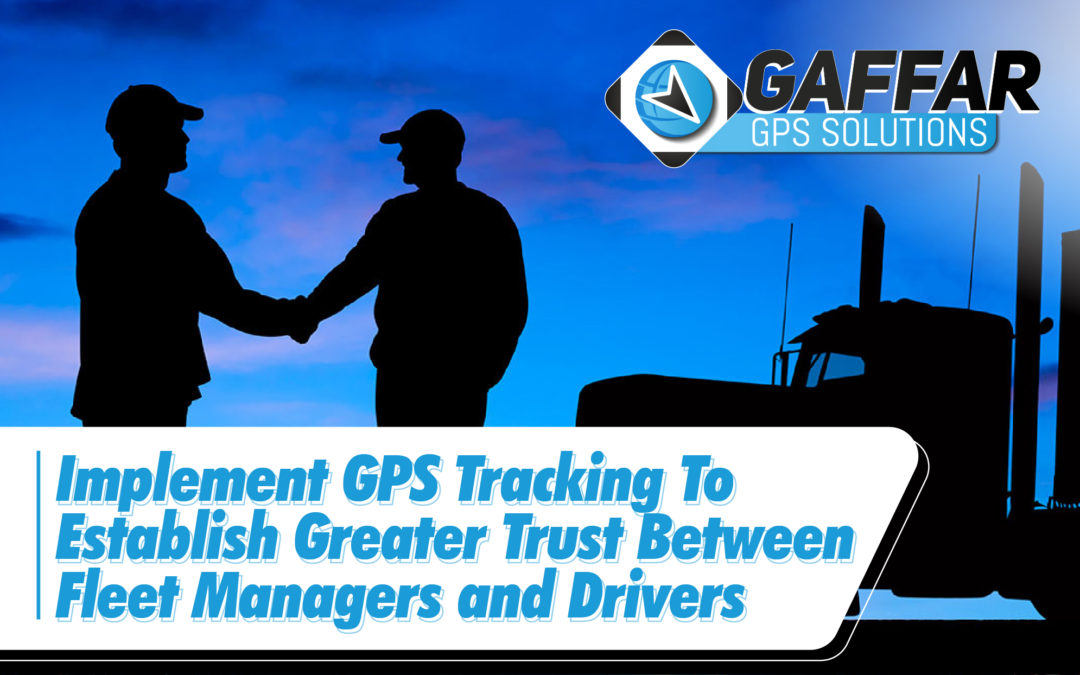Installing Fleet Management Tracking software can cause tension between managers and drivers – who wouldn’t feel a tad bit insulted if their boss didn’t trust them? Nevertheless, Fleet Tracking should not be used to micromanage your trucking staff, but instead it should be used in the way it’s intended – that is, to survive in the industry on a long-term basis. One of the simplest ways to get the most out of your drivers is to keep them happy and motivated to do their jobs. By improving relationships between drivers and fleet management, your company can enjoy more consistent performance from workers who are fully invested in their work. This can be achieved with the implementation of Fleet Tracking, which will allow you to assess drivers performance; amicably address miscommunications, cancellations or other faultless events at a faster pace; and collect data on employees driving routes to optimize efficiency. No one solution will turn around every poor performer, but a multifaceted approach that’s inclusive of a Fleet Management GPS System, to improve driver and manager interactions could have a big impact on your fleet company.
As aforementioned, the issue some fleet managers run into when introducing fleet tracking to their employees is that the employees may perceive the news about the tracking system as a personal intrusion — or, simply put, that you’re implementing GPS technology because you don’t trust them. No fleet manager wants their employees to see an efficient GPS fleet management solution as an impediment to their work or a threat to their livelihoods. In light of this, Gaffar GPS Solutions recommends the following steps in how you can implement the GPS Tracking to establish greater trust between Fleet Managers and drivers.
Clearly explain how the devices will be used and discuss the installation of the GPS System
Be sure that you carefully explain how the GPS Tracking Devices that will be equipped will be used. By establishing clear ground rules, it helps you to:
- Keep your employees in-the-know about how the tracking system will be used and what the expectations are of them regarding the system.
- Reduce concerns about unethical (or illegal) after-hours tracking and monitoring.
- Make employees feel like they are valued and a part of the process.
Employee concerns are understandable. After all, who wants to feel like they’re being watched all of the time? That can create an atmosphere of distrust. That’s why it’s so important to address these concerns early on to prevent them from growing out of control.
By providing a clear explanation of your company’s GPS tracking policy, employees can be made fully aware of the policies of the business or organization regarding the GPS trackers in the fleet vehicles. Some of these key points to address include:
Whether tracking will be active during business hours or 24/7.
- How tracking data is stored.
- Whether the tracking data will be used in employee assessments.
- Any penalties they may face for tampering with the tracking device.
The more detailed you are about the specific benefits of GPS tracking and how you plan to use the GPS tracking devices and live tracking software, the better the trust between yourself and employees will be able to be attained.
Focus on the Benefits of GPS Tracking for Employees
Although the biggest advantages of using GPS fleet management primarily benefit organizations, there are several ways that GPS fleet tracking software can benefit the drivers of fleet vehicles as well as other team members. You want to ensure these benefits are relayed to your drivers.
- Driver Safety. GPS software can help to improve the safety of your drivers in the field. There’s always a risk that the vehicle will break down on the road or get into an accident. By remotely monitoring vehicle diagnostics, you can make sure that your fleet vehicles are always maintained and are running in the best condition possible.
- Route Optimization. With route optimization, fleet managers are better equipped to provide up-to-date information to drivers regarding traffic, road closures, accidents, and other road obstructions. This tool enables drivers to reach their destinations more quickly, minimizing the frustrations of sitting in heavy traffic.
- Enhanced Emergency Response. In the case of an emergency, GPS systems enable fleet managers to know the exact location where a vehicle is, and can then send that information to local law enforcement or medical emergency responders as needed. This reduces the time that the driver must wait for help.
- Risk Management. The data provided by an effective fleet management system helps managers and drivers to work together to mitigate potential risks. It also provides documented evidence that can be used to clear an innocent driver in the case of a third-party lawsuit.
When employees are informed about the benefits to them and not just the company overall, they may be more accepting of the system, which makes its integration less stressful for them and less disruptive to your business. Of course, there will always be those drivers who may see the glass half empty and feel that their privacy is being breached. Hence, keeping in mind the recommendations listed above, when introducing a new GPS fleet management solution to your employees can make the transition a less daunting process.


Recent Comments